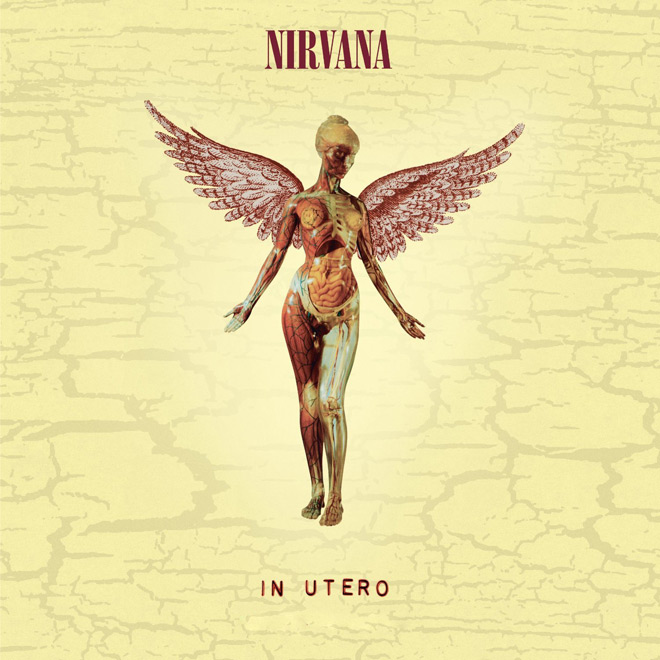With “Smells Like Teen Spirit” and Nevermind, Nirvana single-handedly ushered into being a musical revolution and the entire Grunge movement. On Tuesday, September 21, 1993, they would deliver that album’s epic follow-up, In Utero, to a world that was desperately in need of some (heart-shaped) sincerity.
Nirvana was not an unknown commodity in 1993. Having formed in Aberdeen, Washington, in 1987, their Sub Pop Records’ debut, Bleach, arrived to little fan-fare in 1989. Fortunately or unfortunately, depending upon how you look at it, the band found ironic, massive commercial success with their aforementioned major label sophomore disc, Nevermind. This came much in part to their massive lead single/video, the anthem for the disenfranchised, “Smells Like Teen Spirit,” which exploded the trio onto the scene and placed them into heavy MTV rotation. Infectious noise rockers like “Come As You Are,” “Lithium,” and “In Bloom” followed, cementing the band’s reputation and keeping them at the top of the charts. Of course, 1992’s Incesticide compilation only furthered the Nirvana mystique, and propelled the band –Vocalist/Guitarist Kurt Cobain, Bassist Krist Novoselic, and Drummer Dave Grohl – further into the seemingly unwanted spotlight.
In Utero would be Nirvana’s third and, tragically, final studio album. Of course, no one knew that at the time. Arriving to record store shelves in late September 1993, it was actually recorded in February 1993, at Pachyderm Studios in Cannon Falls, Minnesota. While Producer Steve Albini (Pixies, The Breeders) manned the helm in the studio, Scott Litt (R.E.M., Matthew Sweet) would later be brought in to remix two of the tracks (“Heart-Shaped Box,” “All Apologies”). There was a slight controversy over this at the time, with rumors that the label (DGC) had threatened not to release the record as is, though the band denied this fact. Whatever the case, In Utero did hit shelves on Tuesday, September 21, 1993, and a legion of Nirvana fans rejoiced!
The album contained twelve tracks and kicked off with “Serve the Servants,” where Cobain’s very first line hit hard: “Teenage angst has paid off well, now I’m bored and old.” While, on the surface, the track seemed personal – like much of In Utero – Cobain frequently dismissed this in the press. Bandmate Novoselic would later state the contrary – that Cobain was drawing inspiration from his life and unwanted “rock star angst” at that time. Whatever the case, “Serve the Servants” kicked off In Utero and set the perfect tone for a follow-up album that, despite its middle finger to success, was destined to be a massive one.
What followed was a gentle mixture of the “gateway” tracks that made Nirvana so ironically radio-friendly, and the musical mayhem that allowed the band’s inadvertent genius to shine. Despite the majority of the album being written by Cobain, the threesome co-wrote the distorted, crunchy “Scentless Apprentice” with its infantile screams. “Heart-Shaped Box” was a clear stand-out on the collection, a track that was destined to be the album’s first single/video. While the imagery in its corresponding video may, to this day, remain one of life’s great mysteries, there was no denying that the track was infectious, as undeniably catchy as Nirvana would ever get.
As if to prove that they were not aiming for radio, the trio followed this up with “Rape Me,” a non-PC track if ever there was one. It seemed clear, at the time, that Cobain, in his most disinterested monotone, was using the track to lash out at the media and those that bastardized Nirvana almost from day one. Reportedly influenced by the 1978 biography, Shadowland, of Seattle actress Frances Farmer, “Frances Farmer Will Have Her Revenge on Seattle” missed the “comfort in being sad,” a retrospectively haunting lyric.
The melancholic yet gentle, largely acoustic “Dumb” was a departure for the band, one that beautifully highlighted Kera Schaley on cello. For the short burst of “Very Ape,” they amped back up to heavy bass and distortion, all serving to put a spotlight on Cobain’s raw vocals. This continued into the wall of sound that is “Milk It,” which in turn leads to the catchy “Pennyroyal Tea.” This wasted no time in jumping into the heavy noise and ample feedback of the ironically-titled “Radio Friendly Unit Shifter,” before the band went completely postal on the gut-punch of “tourette’s.” Album closer “All Apologies,” which in a way mirrored “Dumb,” would become a massive favorite much in thanks to the band’s poignant MTV Unplugged performance.
There’s a sincere bipolarity to In Utero, one that perfectly fluctuates between biting, aggressive assaults and gentle meanderings in the name of life’s simple pleasures; it’s something that cannot be successfully scripted, though many have tried. Whatever the case, many fans immediately grasped onto the genius of the album, and it debuted at No. 1 on the Billboard 200 at the time of its release; would go on to be certified 5x Platinum in the U.S. and Gold, Platinum or better in nearly 20 countries; ultimately selling over 15 million copies worldwide. While the reviews were largely positive, there were some mixed opinions – but Nirvana never really cared much about that.
Sadly, after completing their first American tour in several years, in support of In Utero, the band headed over to Europe for a six-week, ill-fated tour. They began in February 1994, but by March 6th, Cobain had suffered a drug overdose and was hospitalized in Rome. Heading back home to the States to recoup, it was reported that the beloved vocalist had entered rehab, though he went missing shortly thereafter. On April 8, 1993, the day that Seattle died, Kurt Cobain was found dead from an apparent suicide in his home. You know the details – they broke the hearts of a generation of music lovers.
In perhaps the most tragic case of irony, the accolades and accomplishments garnered by Nirvana are endless and continue to this day. Most notably, in 2013, a 20th anniversary pressing of In Utero was released with a ton of bonus material, and in 2014, Nirvana was inducted into the Rock and Roll Hall of Fame in their first year of eligibility.
It is nearly impossible to put to words, particularly a short set of words, what In Utero and Nirvana have meant to so many fans. They have inspired countless bands, contributed to the growth of an entire genre, and changed the scene of popular music in the 1990s and beyond. Love them or hate them, you have an opinion about Nirvana and that is a testament to the strength of their music: it cannot be ignored, even twenty-five years later.







No comment